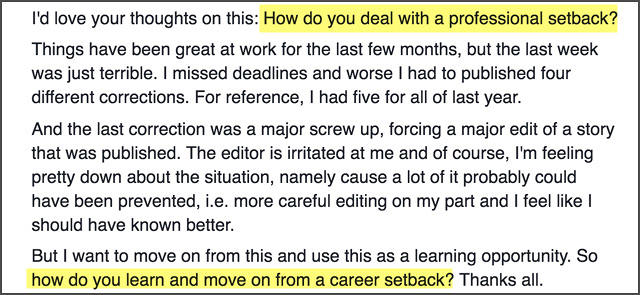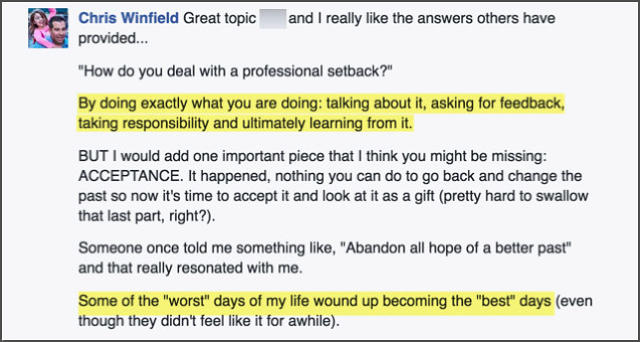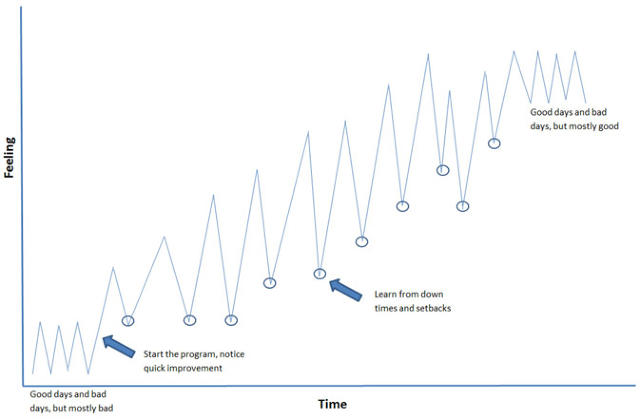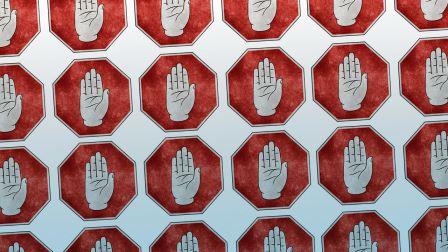How I’ve Learned To Overcome Setbacks In My Life And Career
A few weeks ago, one of my students posted this in my Facebook mastermind group (emphasis mine):

Let me start by saying that I applaud this woman for having the courage to step up, share her story, and ask for help so she can overcome this and move forward again. It’s actually pretty damn hard to admit when you’re not in a good place professionally and to then ask for help.
I wrote an initial response with my thoughts (below), but I wound up thinking more and more about this topic and it got me thinking about some of my own struggles.

I thought about where I was just a few short years ago, when I was part of a business that completely imploded—and that was after putting in 60- to 80-hour workweeks.
Ultimately, I was left pretty much broke and with no clue what I was going to do, wondering where on earth I was going to go from there. How was I going to support myself, let alone my family? But I got through it—and I came out stronger and happier than ever. Why?
I also thought about something that I went through recently, when life punched me in the mouth. A few hours before I was supposed to speak to a room full of entrepreneurs, I learned that my older brother Dan had passed away. I was completely and totally devastated, yet I still gave that talk. Why?
Then I thought about all of the amazing people I’ve met in my life who have been through unbelievably difficult circumstances and not only made it through them but found a way to turn them into something positive.
Finally, I thought of the flip side—those times when I was met with defeat and did nothing. I cowered. I crumbled. I didn’t learn from it—and the many people I know that have done the same.
Why—and what was the difference?
The Different Types Of Obstacles We Face
Although setbacks, roadblocks, and defeats are all obstacles standing between where you are now and where you want to be, each one represents a different level of challenge. Here’s how I’d break that down.
1. Setbacks are usually relatively minor—”hiccups,” really, in that they don’t actually stop you. They’re more like speed bumps—they simply slow you down. Think of them as a problem that makes your progress harder or success less likely.
One example of a setback would be if you had a project slated to start on Monday but for whatever reason, it couldn’t start until Tuesday. It’s not a huge deal, but it does force you to scramble a bit as you try to make the necessary schedule changes so everyone and everything is in place for the new time.
2. Roadblocks are obstacles that do a little bit more than just slow you down. They’re more like tar paper. They actually threaten to make you stuck. They’re something that impedes your progress or prevents you from accomplishing something.
Maybe you planned to have a project completed by Friday, but something came up and you couldn’t finish it until Monday, completely missing your deadline and making your boss or client super mad at you—possibly to the point where you’re not sure if you can repair the damage.
And even if you’re able to keep your job or retain your client, you’ll probably feel some lasting effects from it. If it’s a client, maybe you’ll no longer be the first one they go to for bids on high-paying projects. If it’s a boss, perhaps you’ll find that you’re given less important work because you “can’t be trusted.”
Again, you can bounce back from these types of issues, but it’s going to take some time and a lot of effort.
3. Defeats are the mothers of all setbacks and roadblocks, the life-changers that can force you to do a complete 180 and wonder, “What the heck am I going to do now?”
Examples include not getting that promotion you thought you were going to get (or was promised), or being let go. These aren’t setbacks’ tiny little jabs designed to let you know they’re in the boxing ring with you, or even roadblocks’ punches that knock you down but make you want to get up and try even harder. These are TKOs—total knockouts. Not only are you on your back, but you’re down for the count.
The good news is, no matter which one you face—a setback, roadblock, or defeat—you don’t have to raise your hand and surrender. Think about how you typically respond to these different types of obstacles: What’s your normal reaction?
The “Normal” Responses To Obstacles
When face to face with a career-related obstacle, some people cast blame. They point to all the reasons or circumstances that “put” them where they are.
If this is you, you might tell yourself (and probably everyone else) how the reason you got in trouble is because “My boss is a real jerk!” or that you wouldn’t have lost that promotion “if only my cat hadn’t climbed that tree, making me late for work—again.”
Another normal response to a setback, roadblock, or defeat is anger, like you’ve just been unjustly convicted of a crime you didn’t commit. You might feel a little frustrated or sad because you let yourself (and your employer or client) down, or because you’re not quite where you wanted to be at this point in your life. And depending on the size of the consequence you face, you might also be a little (or a lot) scared about what lies ahead.
While all of these responses are “normal,” if this is how you react, you are actually hurting yourself.
The Problem With These Responses
While it’s understandable to feel frustrated, sad, angry, and scared when dealing with a career-related obstacle, these types of “normal” responses present an issue—a huge one, in fact.
None of these negative reactions, feelings, or responses will help you get wherever it is you want to go. Worse yet, they can even stop you dead in your tracks.
A 2010 University of Miami study found that people in depressed states (which is where we tend to be when facing a career-related obstacle, no matter how big or small) who aren’t able to get over the obstacles in their lives were “more likely to ruminate on their troubles.” They become caught up in their despair like dust in a tornado, going around and around and around—using lots of energy but not really getting anywhere.
Is this how you feel? Like you’re just spinning in circles and unsure how to get out of the turmoil so you can start to move forward again? If so, here’s something important to remember . . .
Setbacks Happen To Everyone—Even Really Successful People
Every successful person, the ones we tend to look to for inspiration in our own lives, has faced their fair share of setbacks before, during, and after achieving something great.
Steve Jobs’s story is well-known. He cofounded Apple (which was Macintosh at the time) at the age of 21, becoming a millionaire within two short years. A few years after that, after having a disagreement with the company’s cofounder, the board decided to remove him from his position at Apple, essentially firing him from the company he helped create.
This led to a midlife crisis in which Jobs thought of all his other career options, which led him to create two more successful companies (NeXT and Pixar) before returning to Apple, which was floundering after he left. So even though he once found himself without a job, he was able to turn things around and lead Apple to its position as a leading global tech firm.
Another example is Mark Cuban, who worked at a bank when he was 22 and decided that he wanted to show his entrepreneurial side by sending “notes” to the CEO about how he could save the bank money, even taking it upon himself to write a company newsletter. Although he thought he was doing a good thing, Cuban’s boss didn’t quite feel the same, eventually calling him into his office asking him not-so-nicely who he thought he was.
Cuban ultimately left that job and moved in with friends, where he slept on the floor while working as a bartender. Sometime after that, he was hired by a PC software company, earning a good salary and commission—until he got fired.
But Cuban didn’t let that stop him, and now he owns Landmark Theatres, Magnolia Pictures, the Dallas Mavericks, and many other companies he’s partnered with through Shark Tank. All in all, his net worth is now over $3 billion.
The point is that you, too, can overcome whatever obstacles are in your way. And you can even find yourself in a better place. All you have to do is develop the right strategies. But first, you need to realize something very important . . .
There Are No “Straight Lines”
In Change Your Brain, Change Your Life, psychiatrist Daniel G. Amen argues that dealing with and overcoming adversity isn’t a linear progression. As he puts it, “no one gets better in a straight line.” Overcoming your struggles is an up-and-down battle—lots of ups and downs, in fact.
But you need both the peaks and the valleys in order to keep moving forward. The ups remind you where you want to go, and the downs push you to get there.

If you look closely at Dr. Amen’s image, you’ll notice one very important thing: Over time, the ups continue to get higher and the lows aren’t quite as low. In other words, as long as you keep moving forward, overcoming the obstacles in your way, you’ll improve in the long run.
Now, you might be saying, “That’s wonderful Chris, but exactly how am I supposed to get over what’s happened to me?” As is true anytime you want to succeed, you need to have a plan. This plan must include strategies—proven, effective strategies—so you’re actually getting somewhere.
Here are five actionable things you can do right now to help you overcome your setbacks, roadblocks, and defeats—so you emerge victorious on the other side.
1. Give Yourself Time
One of the very first things you want to do is give yourself time to process what happened. Let your mind absorb what’s happened, and fully realize where you are.
How much time should you take? Lifehacker’s Patrick Allan suggests that if it’s something bigger, you should “give yourself a full 24 hours to let it out.” Whatever amount of time you choose though, Allan says to just make sure “you stick to it.”
Come to terms with what has happened, and then it’s time to figure out how to proceed from there. But whatever you do . . .
2. Don’t Panic
In The Obstacle Is the Way, Ryan Holiday shares how the first American astronaut to orbit the earth, John Glenn, spent almost an entire day in space making sure his heart rate never went over 100 beats per minute. As Holiday writes, “That’s a man not simply sitting at the controls but in control of his emotions.”
This is the same type of control you want to have when you’re faced with a setback.
Yes, give yourself time to adjust, but don’t panic either, as that’s not going to help the situation at all. In fact, it would likely hurt it more than anything because then you just might do something you’ll regret.
3. Make Peace With Your Failures
Body Mind Mastery author Dan Millman says that “fear of failure generates a vicious cycle that creates what is most feared.” Thus, he suggests that you “make peace with failure” so it doesn’t keep you from reaching your potential.
Put another way: Realize that the situation is what it is, accept it, and move on.
Millman uses the example of babies learning to walk to highlight how powerful this concept can be. Can you imagine what our world would look like if, as infants, we didn’t learn to accept our repeated failures—our constant falling down—and get back up anyway?
More importantly, is that how you want to live the rest of your life? Not doing all the things you’re fully capable of doing because you simply gave up?
Of course not. While you can’t change what’s been done, you can choose to deal with it, and you’ll move forward when you do.
4. Cut Yourself Some Slack (But Don’t Let Go Of The Rope)
In a particularly vulnerable and powerful blog post, Tim Ferriss shared that sometimes he gets down and does things like “hit snooze for one-three hours” or contemplates “giving everything away and moving to Montreal, Seville, or Iceland.”
And yet, even though he has struggles, not wanting to get out of bed and considering moving away and starting over, Ferriss doesn’t give up. He still takes some actions that help him power through his low points so these temporary setbacks, or lulls in productivity, don’t prevent him from achieving his goals.
He does little things like meditating twice a day and becoming closer to family. And he does bigger things like raising $100,000 for charity and adding 20 pounds of muscle mass. Ferriss says he basically cuts himself some slack but still pushes forward so that, in the end, he winds up ahead.
5. Regain Your Control
Dr. Greg Winch, psychologist and author of The Squeaky Wheel, says that regaining as much control over your situation as possible is necessary to help you “avoid feeling helpless and hopeless.”
This means considering the actions you can take to help you overcome whatever obstacle is in your way. For example, if you’ve just been called into your boss’s office for submitting a “subpar project,” ask yourself what you can do to keep this from happening in the future. Could you ask for an extension so you can put more time into your work and make it higher quality? What about requesting more tools to help you do your job effectively? Think about the things you can do that are within your control, and you’ll feel less out of control about the situation at hand.
Wharton professor and best-selling author Adam Grant shares that, in life, failure comes in two ways: your actions and your inactions. “When people reflect on their biggest regrets,” Grant says, “they wish they could redo the inactions, not the actions.”
Thus, taking these five actions can hopefully lead you to feel less regret in the long run. When life knocks you down, get back up. And when it knocks you down again, get back up again. That’s how I’ve learned to overcome setbacks, defeats, and roadblocks.
An expanded version of this article originally appeared on Buffer. It is adapted and reprinted with permission.
Fast Company , Read Full Story
(62)


